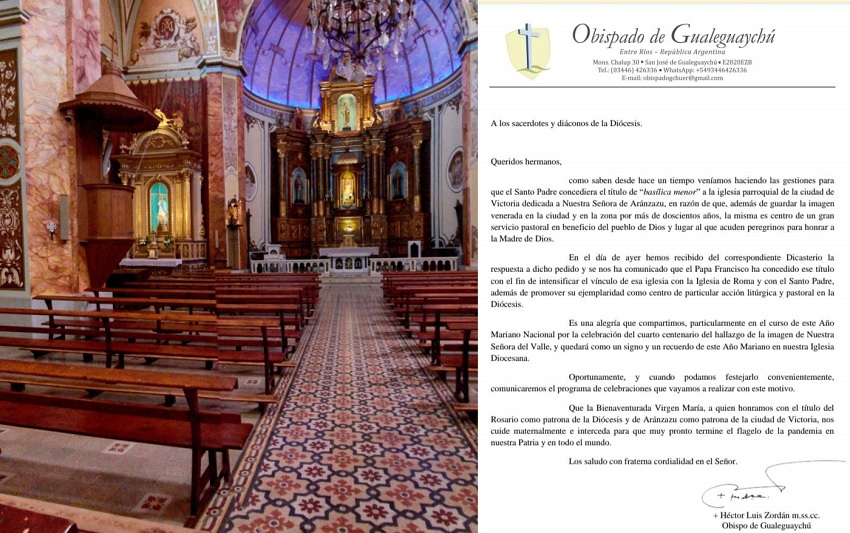Victoria, Argentina. Representatives from the Basque community in Victoria, in the province of Entre Rios, told EuskalKultura.eus the news about Our Lady of Arantzazu Parish being designated as a Minor Basilica by Pope Francis. The title is the result of a request by the local community and according to Fr. Hector Trachitte, “Once the requirements related to culture, history and the pastoral were fulfilled, the Vatican finally approached the corresponding procedure.”
The city of Victoria itself, its parish and of course the local advocation of the Virgin of Arantzazu link their origin to the oratory whose establishment was requested in 1809 by Basque Salbador Juaquín de Ezpeleta (Oiartzun, Gipuzkoa 1776 - Paraná, Entre Ríos 1846), in the place known as “La Matanza.” As a precedent, by then there was a chapel built in 1802 in Punta Gorda on the banks of the Parana river under the protection of this Basque advocation opf the Virgin [photo report Joseba Etxarri]

Our Lady of Arantzazu in Victoria. To the left, Vatican and Argentine flags along with the Basque flag

To the left of the altar, a replica of the Virgin of Arantzazu brought from the Basque Country
The Oiartzun born Founder of Victoria
In the main Plaza de San Martín, in Victoria, next to what is now the Basilica, is the Town Hall, on the street that crosses the plaza, called Ezpeleta. There stands a monument with a chest containing soil from Oiartzun, next to the Ezpeleta statue, with a plaque which reads: "From the people of Victoria to its founder Don Salvador Joaquín de Ezpeleta." A plaque from the Haritz Basque Club in Victoria was added to the tribute, on the occasion of the celebration of the city’s bicentennial in 2010.
As local Community member and former president of the local Basque club Fabian Zorzabal told EuskalKultura.eus, “In 2004, thanks to help from the Basque Government, and in particular to the Minister of Education at the time, Anjeles Iztueta, our parish received a gift of a replica of the Virgen of Arantzazu that was donated by the Basque Country and brought to the parish by Raul Benedetti.” The statue is now located to the left of the main altar.

In front of the new Basilica is a monument to the founder of Victoria, Salbador Juaquin de Ezpeleta

The monument also includes a chest with soil brought from his hometown, Oiartzun, Gipuzkoa

Members of the Haritza Basque Club in Victoria celebrating the city’s bicentennial
Basque Monks in Victoria
But these are not the only important historic links with Euskal Herria in Victoria. In the middle of a nature, in the hills that surround Victoria, there is a Benedictine Abbey of the God the Child, founded in 1899, by Basque monks from the Abbey of Belloc (Beloke in Basque), in Lapurdi. It constitutes a spiritual, tourist and economic reference point for Victoria.
Dozens of monks, priests from all over the Basque Country have come through this center, one of the main, and most active abbeys in Argentina. Religious with sonorous last names like Errecart, Beguiristain, Haran, Bernachea, Oxarart, Urricarriet, Aizpuru, Sarazola, Balerdi, Lasa, Zaldua, Odiart, Ospital, Belza, Carrique, Daguerre, Bernachea, Yrigoyen, Ardans, Ormaechea, Fourcade, Galzagorri or Zugarramurdi, among others carried out their pastoral work from here and lie buried in its cemetery, a sample of one more episode of the Basque contribution to the nation of Argentina.

Arriving view of the Abbey of God the Child, founded by Basque Benedictine monks in 1899

The Abbey’s cemetery with tombs of dozens of sonorous and recognizable Basque surnames

Planting an oak and installing a plaque given by the Haritza Basque Club in Immigrant Plaza in Victoria

Oak being planted by Basque Club's pres. Fabián Zorzabal and other authorities on November 7, 2007
Representatives of the local Catholic community have stressed that the designation of the new Basilica isn’t just an honor for the local believers, but that it also reaffirms the objective of “intensifying the link between the church with that in Rome and the Holy Father, it allows us to promote its exemplarity as a unique center of liturgical and pastoral action in the diocese …”
When the period of isolation caused by COVID-19 passes, a program to celebrate the designation will be announced.
One more link between Euskal Herria and Argentina.






 Send to a friend
Send to a friend Add comment
Add comment








